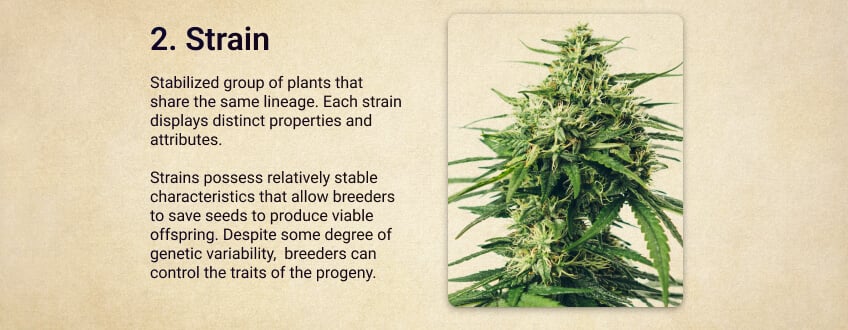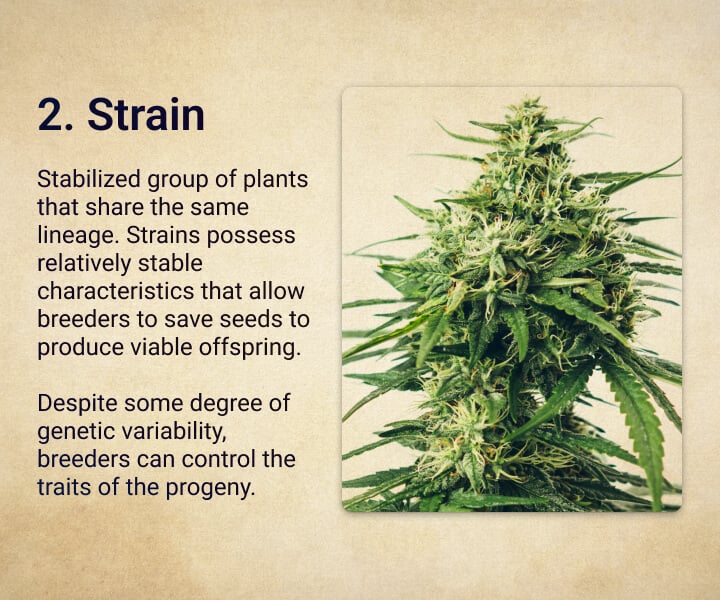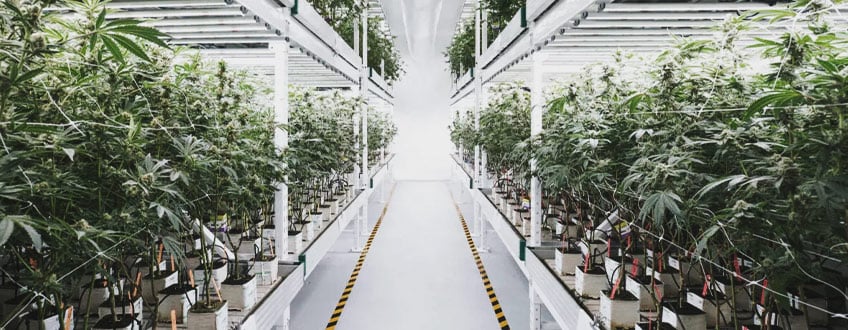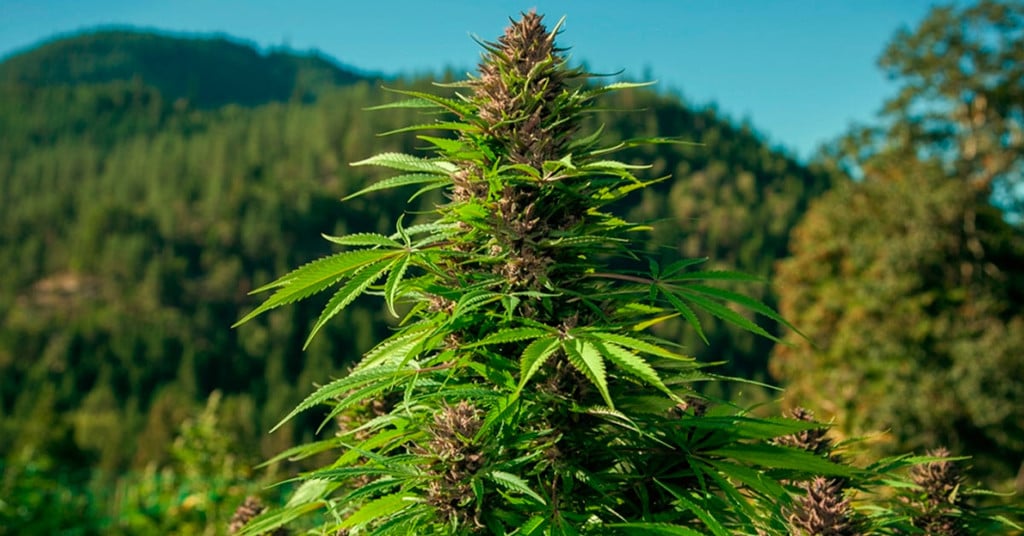.

Cannabis Breeding: From Landraces to F1 Hybrids
Cannabis breeding is nothing new. Humans have farmed crops for thousands of years, including weed. Growers of old even selectively bred wild-type varieties into useful landraces cultivated for fibre and medicine. In the modern era, weed breeding has taken huge leaps forward, thanks to a wide range of advanced techniques.
Cannabis breeding has come a long way over the past several thousand years.
It all started with rural farmers creating primitive landrace varieties. In the modern era, breeders have taken these genetics and created many of the hybrids we know and love. On top of this, skilled breeders have created the first true F1 cannabis hybrids, and biotech companies are even looking to genetically modify cannabis.
Find out about the breeding journey of the cannabis plant below.
Contents:
Landrace Strains: The Origins of Cannabis Cultivation


Cannabis, one of around 170[1] species in the Cannabaceae botanical family, originated in present-day China[2]. Here, plants existed as wild-type varieties as they spread and adapted to new conditions. Around 12,000 years ago, humans began domesticating cannabis as budding civilisations started to discover value in the plant as an industrial and medicinal crop.
By saving seeds from plants that grew larger, produced more flowers, resisted diseases, and provided more useful fibrous stems, early farmers engaged in the act of selective breeding—a strategy still employed today to create more valuable cultivars.
Over time, these plants not only developed traits sought after by human growers, but they adapted to new environments as they travelled great distances through trade and migration. Through this activity, the first landrace cannabis plants arose. By definition[3], these cultivars are dynamic populations of cultivated plants that are locally adapted, lack uniformity, and feature historical origins. Landrace cannabis strains hail from humble origins but laid the genetic groundwork for all of the old-school classics and modern hybrids we enjoy growing and using today.
Several landrace varieties maintain a special status in the cannabis community and are still used as breeding stock to create modern hybrids. Some of the most loved landrace strains include:
- Acapulco Gold: This legendary landrace stems from the Guerrero mountains of Mexico and remains a prized parent strain among contemporary breeders. High levels of THC, great yields, and a potent high make her an easy choiceate energetic and hard-hitting strains.
- Thai: Native to Thailand, this landrace features towering heights, a cerebral high, and aromas of wood, chocolate, and diesel. Breeders have used Thai genetics to create legendary strains including Blueberry and Blue Mystic.
- Afghan: Native to northern Afghanistan, this landrace won favour among breeders thanks to its sheer hardiness. Afghan-derived specimens exhibit impressive resistance to weather extremes and develop bushy and productive canopies.
Hybridisation: Combining Landrace Strains


In more recent times, cannabis breeders have intentionally crossed diverse landrace varieties to produce modern hybrids. These strains are the result of selective breeding and typically possess much higher levels of terpenes and cannabinoids than their landrace ancestors.
The term “strain” refers to a stabilised group of plants that share the same lineage. Each strain displays distinct properties and attributes, such as a particular terpene profile or unique cannabinoid concentrations. The terms “cultivar” and “variety” are often used interchangeably with “strain”. Strains also possess relatively stable characteristics that allow breeders to save seeds to produce viable offspring. Despite some degree of genetic variability, the breeding techniques discussed below allow breeders to control traits of the progeny.
To kickstart the hybridisation process, breeders select two parent landraces with the traits they want to see expressed in the offspring. During this process, they’ll look for key features including:
- Height and shape
- Resin production
- Yield potential
- Flavour and aroma
- THC (and other cannabinoids) content
For example, one parent might produce a heavy yield while the other possesses plenty of THC. The result? A highly potent and productive variety. The first wave of hybrid offspring is referred to as filial 1 (F1) hybrids. However, this label is often used incorrectly, as you’ll see below.
Commercial breeding operations also need to consider consumer demand—a factor that changes with emerging trends. In the modern era, fruity and sugary tastes and astronomical levels of THC reign supreme; breeders need to identify these traits in parent varieties to create strains that appeal to contemporary smokers and growers.
While some modern hybrids do descend directly from landraces, others are known as polyhybrids; they’re the result of crossing two hybrid parent strains. While this produces desirable results, the offspring typically feature high levels of genetic diversity and lack uniformity and reliability when it comes to phenotypes.
Modern Breeding Techniques: Creating New Strains
The creation of many stable modern varieties involves much more than simply crossing two landraces or hybrids over a single generation. Breeders employ a host of techniques to bring these cultivars to market.
1. Crossbreeding
Crossbreeding simply involves breeding one parent strain with another; the offspring will possess traits from each parent. From here, breeders use some of the techniques below to further refine their work.
2. Backcrossing
Because both landraces and hybrids feature high genetic diversity, further steps are required to develop phenotypes with a uniform expression. To achieve this, breeders will often cross an F1 plant with one of its parents. This reinforces certain genetics within the offspring and expresses more of the desired traits within the progeny, such as disease resistance or terpene concentration.
3. Tissue Culture
Legalization means cannabis cultivation has left the hands of small-scale growers and has entered the commercial world. Massive facilities are employing large-scale means of horticultural production, including tissue culture. This form of propagation does away with soil and instead grows plant tissue on sterile media infused with growth regulators. This allows companies to clone and experiment with huge amounts of germplasm in a relatively small space with minimal risk of pest and disease outbreaks.

Examples of Popular Modern Hybrids
Many of the modern hybrids that have achieved stardom have humble beginnings as landrace varieties. Using modern techniques, breeders have managed to create some of the most popular strains on Earth, including:
- GG#4 aka Original Glue: The progeny of Sour Dubb, Chem Sis, and Chocolate Diesel, this powerhouse strain boasts a THC level of 27%. She exerts a hard-hitting high and delivers a complex terpene profile characterised by notes of chocolate, diesel, fruit, and pine.
- Girl Scout Cookies: This legendary American hybrid stems from the famous landrace Durban Poison and the prestigious hybrid OG Kush. Loved for her THC content of 23% and sweet and sugary tastes, she remains a firm favourite for cannabis growers across the world.
- OG Kush: Known far and wide, this indica-dominant hybrid was created by crossing Chemdawg, Lemon Thai, and Pakistani Kush. Her THC content of 19% and fruity terpenes offer a mellow experience, whereas her brief flowering time ensures a relatively swift harvest.
F1 Hybrids: A New Botanical Frontier


True F1 hybrids differ greatly from polyhybrids in all areas, including uniformity, disease resistance, and potency. True cannabis hybrids have only just emerged onto the market, but they are positioned to dominate the world of cannabis cultivation.
The process begins by developing inbred lines (IBLs). This requires skilled breeders with adequate facilities at their disposal. By developing highly inbred populations over several generations, they create plants with very low genetic diversity, meaning they’re highly uniform. Alone, this results in plants that eventually perform poorly due to inbreeding depression.
However, crossing two IBLs results in a true F1 hybrid. These varieties undergo genetic rejuvenation and display a phenomenon known as heterosis, or hybrid vigour. This results in superior uniformity, productivity, and pest and disease resistance.
F1 hybrids technically aren’t strains, as each specimen doesn’t have stable characteristics that can be consistently reproduced by saving seeds. Instead, breeders have to recreate them by crossing the same parent IBLs. Subsequent generations bred using F1 genetics show increased genetic variability and a loss of hybrid vigour.
The Future of Cannabis Breeding
As the cannabis industry continues to develop, companies are starting to leverage technologies used elsewhere in agriculture. As well as creating the first F1 hybrids—a technique long used in food crop production—a handful of businesses are looking to turn select strains into genetically modified organisms (GMOs).
Currently, cultivators are using over 40% of cropland in the United States to grow GMO food. Biotechnology companies use a range of techniques to modify or edit the genome of plants to achieve a desired outcome. These methods include inserting foreign DNA, sometimes from other plant species, into a target plant's DNA. Technology such as CRISPR (which stands for "clustered regularly interspaced short palindromic repeats") allows scientists to splice plant DNA and edit it to change the way crops grow and perform.
The purported benefits of GMOs include improved nutritional value, increased food production, and increased resilience to pests. When it comes to growing weed, modifying or editing the genes of select strains can increase THC content, improve yield, and make varieties more resistant to bothersome pests and diseases. This all sounds great, but GMOs also have several downsides, including environmental and economic implications. The chief concerns surrounding the technology include:
- Allergies: Genetic modification can introduce new allergens to crops. Cannabis allergy does exist, and GMO strains could increase this risk in some consumers.
- Environmental impact: Pollen from GMO strains has the potential to fertilise plants in nearby growing operations, spreading modified genes into other populations of plants.
- Monopolised markets: It’s no secret that big businesses and their investors quickly established themselves in nascent cannabis markets. However, an entire sector of craft growers, offering sun-grown organic weed, still stands strong. The introduction of GMO cannabis raises more concerns about centralisation within the industry. Companies using patented technologies and genes introduce a battery of legal and ethical issues, especially when it comes to the ownership of the initial strains used in the research and development process.
Right now, GMO weed strains are confined to research laboratories and aren’t commercially available. However, it seems inevitable that they’ll penetrate the market at some point. Much like GMO food, their success hinges on consumer acceptance.
Breeding as a Home Grower
The world of cannabis breeding seems complex at first glance, but it boils down to introducing male pollen to female flowers in a controlled setting. If you come across two varieties that you think would work well as parents, you can easily breed and preserve your own variety at home.
To find the best parent strains for you, consider your personal preferences. Hunt down predecessors that tick your boxes in terms of size, structure, THC content, flavour and aroma, resin production, and subjective effects. After finding ideal parents, breeding at home has several key advantages. It’ll enable you to develop new skills and work with cannabis plants on a deeper level. Plus, you’ll create strains tailored perfectly to your preferences.
Simply place a high-performing male and female in a tent together, ensure male pollen makes contact with the female stigmata, and save the seeds! Granted, you won’t end up with the most stable genetics at first. However, just like with growing, you’ll develop a refined skill set over time. Just remember that your batches will yield regular seeds, so watch out for males.
As you’ve seen, the world of cannabis breeding has changed dramatically over time. Over the last few decades, breeders have worked hard to produce hybrids from landrace strains that offer high levels of THC, faster flowering times, tasty terpene profiles, and bigger yields. More recently, breeders have unlocked the first true F1 hybrids. Not only do these varieties offer even more THC and terpenes, but they’re faster, more uniform, easier to grow, and more resistant to disease. This important milestone has made growing weed more accessible than ever before.
- https://www.liebertpub.com/doi/10.1089/can.2018.0039
- New Study Suggests Cannabis' Wild Ancestors Likely Came from China | Science| Smithsonian Magazine https://www.smithsonianmag.com
- Toward an Evolved Concept of Landrace - PMC https://www.ncbi.nlm.nih.gov








































